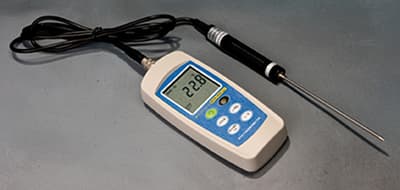
Thermco® Certified Mercury Milk Testing Thermometer - 76 Immersion, 0.5°F Divisions, 15"
Thermco's certified mercury milk testing thermometer is a specialized instrument used in the dairy industry to measure the temperature of milk during various stages of processing and testing.
Engineered for swift and effortless measurements, the milk testing thermometer features a durable outer glass construction and is designed for repeated use.
The mercury thermometer offers high precision due to mercury's uniform expansion rate and its non-stick, non-reactive properties with glass, ensuring durable and stable temperature readings. Its resistance to compression is vital for accuracy in varying pressures, while the metal's shine enhances measurement visibility.
The dairy thermometer's 76mm immersion depth capability ensures the sensitive part is adequately submerged in the fluid for accurate temperature reading, minimizing the influence of external factors.
The divisions of 0.5°F on the Thermco thermometer enable more accurate temperature readings, which is vital in processes such as pasteurization. Maintaining specific temperature ranges is essential to kill harmful bacteria while preserving the nutritional quality of the milk. These precise divisions aid in adhering to stringent regulations, thereby minimizing the risk of penalties or recalls of products.
Dual-point validation at 45°F and 90°F ensures the accuracy of milk testing thermometers across essential temperature ranges, from processing to storage, critical for milk safety, regulatory compliance, and quality in the dairy industry.
The 15" thermometer has specific temperature ranges, such as 0-230°F and 30-214°F, that offer distinct advantages for various applications, ensuring precision, safety, and efficiency in both general and specialized tasks.
Utilizing a certified milk testing thermometer by Thermco assures adherence to global and local quality and safety standards in milk production. The reliable immersion device is crucial for dairy farmers, processing plants, and quality labs, ensuring precise temperature control for pasteurization, cooling, and storage, thus improving milk safety and reducing foodborne illness risks.




